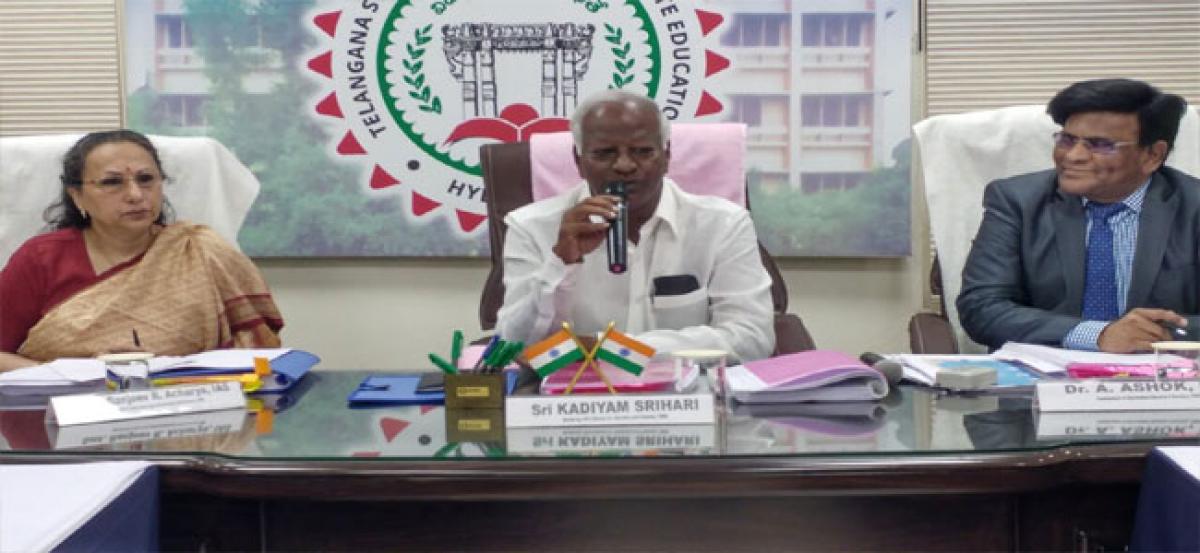Live
- Three Dead In Delhi Building Collapse Amid Heavy Rain
- District SP T. Srinivas Rao, IPS, Expresses Condolences on the Death of Woman Constable in Road Accident
- District Additional Collector Narsinga Rao Stresses Effective Implementation of Nasha Mukt Bharat Abhiyaan
- State Government Distributes Mahalakshmi Scheme Gas Cylinder Certificates under Abhaya Hastham
- Demand for Immediate Operationalization of 100-Bed Hospital in Alampur Constituency and 30-Bed Hospital in Aija Mandal
- Minister Komatireddy Venkat Reddy Criticizes Past Government for Yadadri Power Plant Neglect
- Nine persons injured in explosion at a house in Kishanbagh
- Design Democracy 2024 - Shaping the Future of Design, Art, and Innovation
- HDFC Pension Becomes First Private Sector Pension Fund Manager to Surpass Rs. 1 Lakh Crore in AUM
- University of Melbourne launches Global Centre in Delhi
Just In

The Telangana State Board of Intermediate Education (TSBIE) will be overhauled and turned into an academic specific organisation than a regulator of Intermediate education in the State.A decision has been taken in this regard on Tuesday at the board meeting of the TSBIE which was held under the chairmanship of Deputy Chief Minister and Minister for Education Kadiyam Srihari.
Minister for Education Kadiyam Srihari says the board, which already won national award for digitisation, will be made the best
in the countryHyderabad: The Telangana State Board of Intermediate Education (TSBIE) will be overhauled and turned into an academic specific organisation than a regulator of Intermediate education in the State.A decision has been taken in this regard on Tuesday at the board meeting of the TSBIE which was held under the chairmanship of Deputy Chief Minister and Minister for Education Kadiyam Srihari.
Highlights:
- More members will be added
- Vocational courses will be introduced
- Board to meet every six months
- Action will be taken against erring private colleges
The board will be reconstituted by inducting some more members over and above the present members. Academicians will be brought into the board to make it more academic specific.
The Board of Intermediate Education is responsible for the activities of junior colleges in the State. However, the board confined itself to check the revenue and expenditure of the BIE without touching the academic activities.
Speaking at the board meeting, the Deputy Chief Minister said the TSBIE would be made the best one in the country which already won national award for digitisation. He appreciated the efforts of the board for its endeavors in this regard.
The Deputy Chief Minister said though the board was supposed to meet for one in six months, the meetings were not conducted. He made it clear that henceforth the board would meet for every six months. Vocational courses would be introduced in the Intermediate education so that who passed Intermediate could get job.
A committee would be formed with the experts from JNTU and Health Department to choose vocational courses. The committee would give its report in two months and new courses would be introduced from the next academic year based on the report. The vocational courses which did not have demand in the market would be removed.
Profile of each of the 404 government junior colleges will be prepared with the details of facilities and faculty and placed in the website of the BIE so that parents will be able to know the best college to choose for their wards.
The board will be strict about the private colleges and affiliation will not be given to the institutions which do not meet the mandatory stipulations with regard to facilities and faculty.
Due to permissions to colleges which were not following rules, it has been leading to allegations on the BIE. Srihari said the BIE had firmed its grip on private colleges after the formation of Telangana State which used to dictate terms to the board in the past. Huge amounts had been collected in the form of penalties which flouted the rules, he added.
Srihari said a lot of reforms had been brought in the Intermediate education, and education was provided free of cost. “Labs and other facilities have been improved in the government junior colleges with a cost of Rs 325 crore. All government junior colleges have been provided with buildings.
Each college has been provided with biometric attendance equipment, RO plants, CC cameras and others. So far, 22 services of the BIE have been provided online and more services would be added,” said the Minister.
The Deputy Chief Minister said due to the steps taken by the government, the admissions in the government junior colleges had increased. While the strength was 1.23 lakh three years ago in government colleges, it rose to 1.80 lakh this academic year.
The demand for establishment of government junior colleges has been increasing with the improvement of facilities. New colleges would be established wherever there was a need, Srihari said.

© 2024 Hyderabad Media House Limited/The Hans India. All rights reserved. Powered by hocalwire.com







